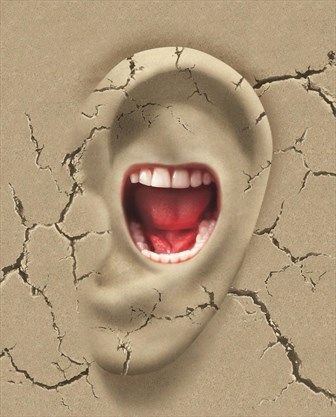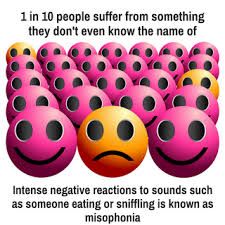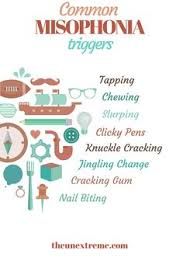Auditory Rage
Apr 27, 2019 • 38 views
Do social gatherings make your skin crawl?
Does slurping, burping or any sound that comes out of a person's mouth other than talking makes you feel disgusted?
This may be the result of having Misophonia.

Certain sounds seem to trigger a few people unlike others. This trigger most often than not, is a severe emotional response to something that many would state as a routine activity. This disorder is known as ‘Misophonia' or ‘Selective Sound Sensitivity Syndrome'. This disorder is basically due to ‘hatred of sound'. There is very little known about this mental disorder. Doctors recognized this is as a mental disorder only in 2000. They first categorized it under anxiety andafter undertaking research on Misophonia, they found it to be a serious syndrome that affects large number of people.
Misophonia might relate to higher creativity


When misophonic people hear their trigger sounds, it results in an emotional response or a physiological response which other people might describe as unreasonable given the circumstances.
A misophonic person would describe their responses or their reactions as a sound that literally "drives you crazy and pushes you to do something out of your own control". The responses might be mild or severe varying from person to person. The mild response is when the misophonic person feels distressed and annoyed, the severe response is when the person is panicking or is filled with an urge to flee the situation immediately and is also full of rage.
What are the trigger sounds?Is it only sounds?
There are a lot of sounds that trigger a misophonic person into a ‘misophonic attack' and it is usually not just the sound but also visual stimuli that triggers their response. The sounds may be oral sounds like chewing, slurping, burping, loud breathing. It might also include keyboard sounds, finger and foot tapping or the sound of the windshield wipers. Even repetitive motions like when someone fidgets, jostles or wiggles their foot can trigger a response in a misophonic person.
Visual stimuli might also trigger a misophonic person. The very sight of a person getting ready to eat or drink might set a misophonic person off. People with misophonia often say that visual stimuli that accompany their trigger sounds stimulate their emotional and physiological responses and also that they may even react to repetitive sounds.
This disorder might seem like something silly andcontrollable but unfortunately, it is not. This disorder comes in between the person and the various relationships the person has with the world. They start to avoid the situations or places that trigger their responses which means many of them will avoid eating at restaurants or at public places or with family and friends. It is fine until they do no act on their emotional responses because if they do, they might attack the person making the noise, cry out loud or even abruptly leave the place making a very bad impression and also making the other person feel very bad.
The various emotional responses that a misophonic person feels when around their trigger sounds are:
●Anxiety
●Disgust
●Discomfort
●Urge to flee the place
●Anger
●Rage
●Hatred
●Panic
●Severe emotional distress

The age of onset, the cause or the underlying mechanism of the disorder is not known to doctors. Most doctors believe that the symptoms start to show as early as 9-13 years of age. This disorder is much more common in women than in men and is unlikely that is related to any one event.
Doctors have confirmed that this disorder has nothing to do with a person's ears but a lot with their brain. This disorder is believed to be half brain and half body related.
A study done by the Newcastle University also suggests that misophonics or people with a severe reaction to sounds might have a brain abnormality. The study published in the journal ‘Current Biology', suggests a difference in the frontal lobe between those who have an intense reaction to sound or misophonics, and those who don't have that reaction.
Researchers have also suggested a connection between the limbic system (part of the body responsible for generating emotions) and the auditory system of a person. They have also linked misophonia to Obsessive – Compulsive Disorder (OCD) and Post Traumatic Stress Disorder (PTSD).
Many psychologists believe that people suffer from this disorder because they are unable to shut out irrelevant sensory information. They also believe that this inability to shut out irrelevant sensory information from their brains can be linked to creativity and above – average intelligence. Findings in the journal, Neuropsychologia, suggests that people with the affliction would be more creative because of their ability to focus on multiple things at the same time.
There is a wide variety of treatment available for people who suffer from Misophonia which includes speech therapy by audiologists and supportive counseling. Lifestyle changes are also recommended by many psychiatrists. It is also recommended to distract oneself with another pleasant and soulful sound. Other treatments include talk therapy.
Even though there is no agreed upon therapy or solution to misophonia it is important to know that"You are not alone".
